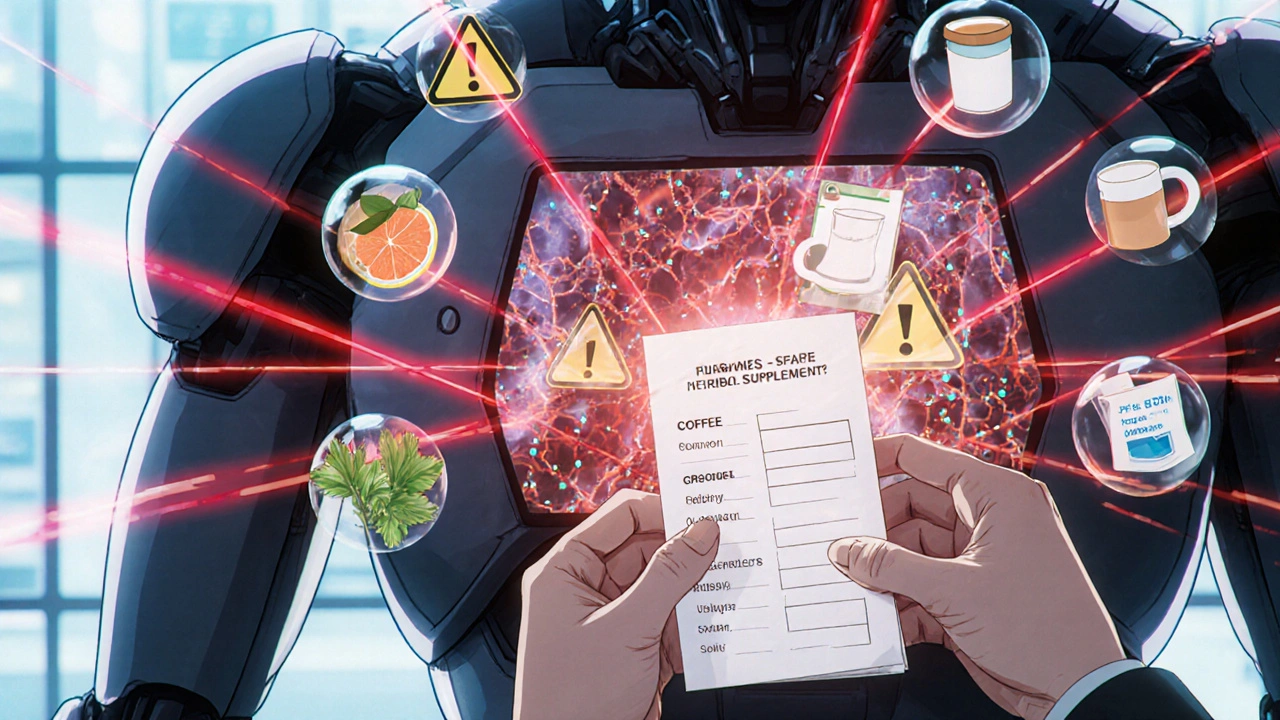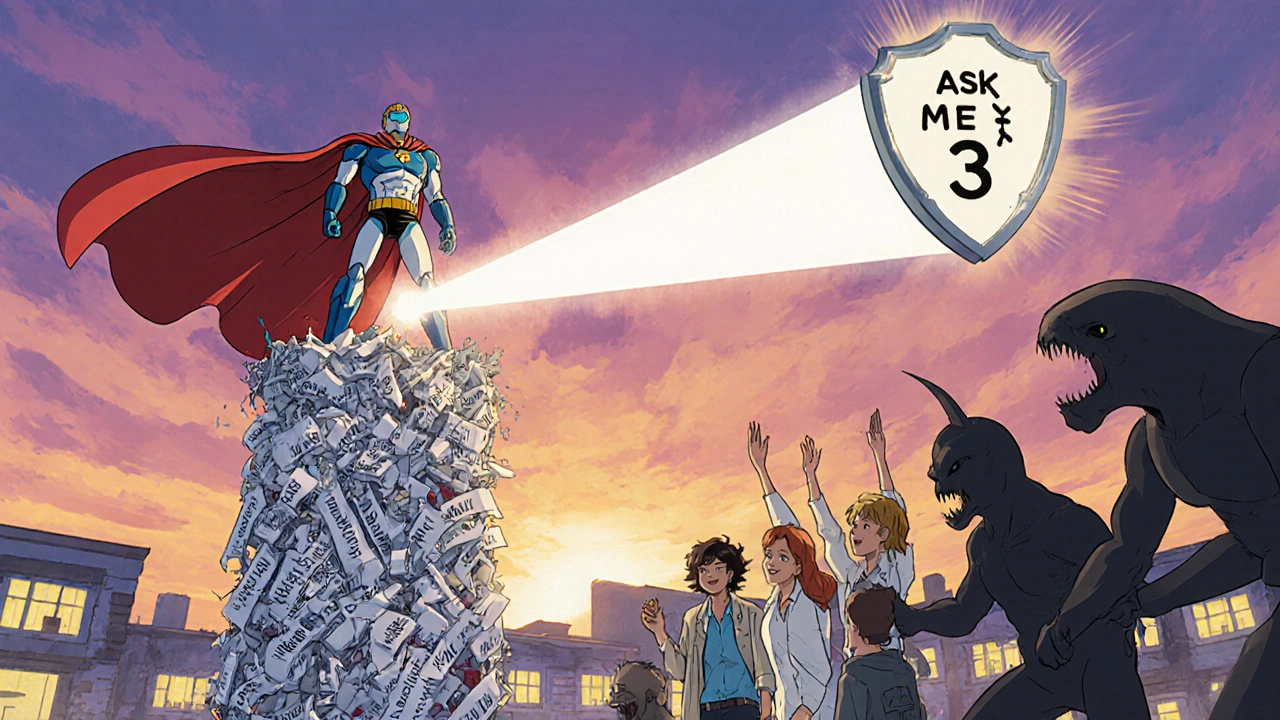Don’t Just Take It-Ask About It
You walk up to the counter, hand over your prescription, and walk away with a bag of pills. But do you really know what you’re taking? Many people assume the doctor explained everything, or that the label says it all. But that’s not enough. Pharmacists are trained medication experts-and they’re often the most accessible healthcare professionals you’ll ever meet. In fact, 94% of Americans live within five miles of a community pharmacy. Yet, most people leave without asking a single question. That’s risky. Medication errors send over 1.3 million people to the emergency room every year in the U.S. alone. The good news? You can cut that risk dramatically by asking the right questions before you leave the pharmacy.
What Is This Medicine For?
It sounds simple, but 30% of medication errors happen because patients don’t understand why they’re taking a drug. Don’t assume the name tells you anything. A pill labeled "Lisinopril" means nothing if you don’t know it’s for high blood pressure. Ask: "What condition is this treating?" and "How will I know it’s working?" Some medications, like statins or antidepressants, don’t give you immediate feedback. You might feel no different, but that doesn’t mean it’s not doing its job. Knowing the purpose helps you stay on track, even when you feel fine.
How and When Should I Take It?
Dosing isn’t just about pills per day. Timing matters. Some meds need food to be absorbed properly-others can upset your stomach if taken with anything. Some work best in the morning; others at night. Ask: "Should I take this with food or on an empty stomach?" "Is there a best time of day?" "Can I take it with my coffee or grapefruit juice?" One common mistake: taking blood pressure meds at night when they’re meant for morning. That can cause dangerous drops in pressure while sleeping. Also, ask if you need to avoid driving, operating machinery, or drinking alcohol. Certain antibiotics, painkillers, and anxiety meds can make you drowsy or dizzy. Don’t guess-ask.
What Side Effects Should I Watch For?
All medications have side effects. Some are mild-dry mouth, upset stomach. Others are serious and need immediate attention. Ask: "What are the most common side effects?" and "Which ones mean I should call my doctor or go to the ER?" For example, if you’re on a blood thinner and start bruising easily or have bloody stools, that’s urgent. If you’re on a cholesterol drug and get severe muscle pain, it could be a sign of rare but dangerous muscle damage. Also, ask about less obvious effects. Some meds make your skin more sensitive to the sun. Others can cause mood changes or sleep problems. Knowing what’s normal versus what’s dangerous helps you act fast.
Could This Interact With Anything Else I’m Taking?
This is one of the most overlooked questions. People forget about over-the-counter pills, herbal supplements, or even vitamins. A 2023 FDA report found that 15% of hospital admissions are due to drug interactions that could have been avoided. You might be taking St. John’s Wort for mood, but it can make your birth control or antidepressants stop working. Garlic supplements can thin your blood-dangerous if you’re also on warfarin. Even grapefruit juice can interfere with dozens of common drugs. Bring a list of everything: prescriptions, OTC meds, vitamins, herbs, and even CBD oil. The pharmacist can spot hidden conflicts your doctor might miss.

What If I Miss a Dose?
Life happens. You forget. You travel. You feel better and think you don’t need it anymore. But skipping doses or stopping early can make medications useless-or even dangerous. Ask: "What should I do if I miss a pill?" Some drugs need to be taken at the same time every day. For others, doubling up the next day can be risky. Blood pressure and diabetes meds are especially sensitive. Also, ask: "Can I stop taking this if I feel better?" Many people stop antibiotics early or quit cholesterol meds after a month. That’s not just ineffective-it’s dangerous. Chronic conditions like hypertension or thyroid disease need lifelong treatment. Your pharmacist can explain why consistency matters.
Is There a Cheaper or Generic Option?
Brand-name drugs can cost 80-85% more than generics-and they work exactly the same. The FDA requires generics to match brand drugs in strength, safety, and effectiveness. Ask: "Is there a generic version?" If not, ask if there’s a lower-cost alternative. Some pharmacies offer $4 generic programs for common meds like metformin or atorvastatin. You can also ask about mail-order options or patient assistance programs. One patient in Sydney saved $1,200 a year just by switching from a brand-name statin to its generic. Don’t assume you have to pay more. Pharmacists know the pricing tricks and can help you cut costs without sacrificing safety.
When Will I See Results?
Some meds work fast-like painkillers or antacids. Others take weeks. Antidepressants can take 4-6 weeks to kick in. Blood pressure meds might not show changes on your home monitor for a month. If you don’t know what to expect, you might think the drug isn’t working and stop taking it. That’s a common reason treatment fails. Ask: "How long should I wait before noticing improvement?" "Will I need blood tests to check if it’s working?" This helps you stay patient and consistent. It also gives you a timeline to follow up with your doctor if nothing changes.
Are There Non-Drug Options?
Medication isn’t always the only path. For mild high blood pressure, weight loss and exercise can help. For acid reflux, dietary changes often reduce symptoms. For osteoporosis, weight-bearing exercise and vitamin D can slow bone loss. Ask: "Are there lifestyle changes that could help?" or "Is this the only option?" Sometimes, a pharmacist can suggest a combination approach-like pairing a low-dose med with a proven supplement or behavior change. This reduces long-term reliance on pills and cuts side effect risks.

Where Can I Find Reliable Info?
Google can give you scary, outdated, or wrong info. Ask your pharmacist for trusted sources. They often have printed patient guides, links to FDA-approved websites, or apps that track side effects. Avoid random blogs or social media posts. The FDA, CDC, and MedlinePlus are reliable. Some pharmacies even offer free online courses on managing chronic conditions. Don’t rely on YouTube videos or Reddit threads-ask for the real deal.
How to Make the Most of Your Pharmacy Visit
Most pharmacy consultations last only 2-3 minutes. That’s not enough time if you’re unprepared. Here’s how to use it wisely:
- Bring a complete list of everything you take: prescriptions, OTC meds, vitamins, herbs, supplements, even eye drops or creams.
- Write down your top 3 questions before you go.
- Ask for a quiet spot if the pharmacy is busy-many have private consultation rooms.
- Use the "teach-back" method: after they explain, say, "So if I understand right, I take this after breakfast, avoid grapefruit, and call if I get dizzy?" This cuts errors by 40%.
- Ask if they offer a medication review. Many pharmacies now offer free yearly checkups to spot duplicates, interactions, or unnecessary meds.
One patient in Sydney brought her list of 12 medications to the pharmacy. The pharmacist found she was taking two different acid reducers that did the same thing-and both were causing kidney strain. She stopped one and saved $300 a year. That’s the power of asking.
Why Pharmacists Are Your Hidden Safety Net
Pharmacists aren’t just pill dispensers. They’re trained to catch errors before they happen. In hospitals, pharmacists prevent 1.5 medication mistakes per patient admission. In community pharmacies, they reduce hospital readmissions by 27%. They’re the last line of defense between you and a dangerous drug interaction. And with new laws letting pharmacists prescribe certain meds-like naloxone or smoking cessation aids-they’re becoming even more essential. If your doctor’s office is full, your pharmacist might be the only healthcare provider you see all month. Don’t waste that chance.
What If You’re Too Busy or Shy to Ask?
Many people feel awkward. They think, "They’re busy," or "It’s not that important." But here’s the truth: pharmacists are trained to answer questions. They want you to ask. The American Pharmacists Association launched the "Ask Me 3" campaign to make this easier: ask three things: "What is my main problem?", "What do I need to do?", and "Why is it important?" If you remember nothing else, remember those three. Patients who ask at least three questions have 65% fewer medication problems.
And if you’re in a rural area with limited access? Telepharmacy services are growing fast. You can now video-call a pharmacist from your phone. Some rural hospitals offer this. Ask your pharmacy if they offer virtual consultations.
Can I ask my pharmacist about side effects I read about online?
Yes, absolutely. Pharmacists see patients who come in worried about every side effect they’ve read online. They can tell you which ones are common, which are rare, and which are myths. For example, many people think statins cause memory loss-but studies show that’s extremely rare. Your pharmacist can separate fact from fear.
Do pharmacists know about my other prescriptions from different doctors?
They can, if you give them the full list. Pharmacies use electronic systems to track your fills, but they won’t know about meds from another clinic unless you tell them. Always bring a list-even if you think they "should know." It’s your responsibility to make sure they have the full picture.
Is it okay to switch pharmacies to get better advice?
Yes. If your current pharmacy is rushed or dismissive, find one that takes time. Many independent pharmacies offer longer consultations. Chain stores are busy, but some have quiet consultation rooms. Don’t stay somewhere that makes you feel like a number. Your safety matters more than convenience.
Can pharmacists help with over-the-counter medicines too?
Definitely. OTC meds can be just as risky as prescriptions. Painkillers like ibuprofen can cause stomach bleeds if taken too long. Decongestants can raise blood pressure. Antihistamines can make you drowsy. Always ask before buying anything-even if it’s "just a supplement."
What if I can’t afford my medication?
Pharmacists know about patient assistance programs, discount cards, and generic alternatives. Many drugmakers offer free or low-cost meds for people who qualify. Ask: "Is there a cheaper option?" or "Can you help me find financial help?" They’re trained to help you get the meds you need, not just the most expensive ones.
Next Steps
Before your next prescription refill, write down three questions. Bring your full medication list. Ask for a quiet moment. Don’t be shy-your pharmacist is there to help. If you’re on long-term meds, ask for a yearly medication review. That’s free in most places. And if you’re ever unsure-ask again. Better to ask ten times than risk a mistake once.

Aidan McCord-Amasis
November 14, 2025 AT 09:57Shyamal Spadoni
November 14, 2025 AT 20:06Edward Ward
November 15, 2025 AT 18:07Chris Bryan
November 16, 2025 AT 15:18Jessica Chambers
November 18, 2025 AT 00:25BABA SABKA
November 18, 2025 AT 01:07Ryan Airey
November 19, 2025 AT 23:33Jonathan Dobey
November 21, 2025 AT 17:08ASHISH TURAN
November 23, 2025 AT 03:14Hollis Hollywood
November 23, 2025 AT 04:06Andrew Eppich
November 24, 2025 AT 23:05Ogonna Igbo
November 25, 2025 AT 06:35